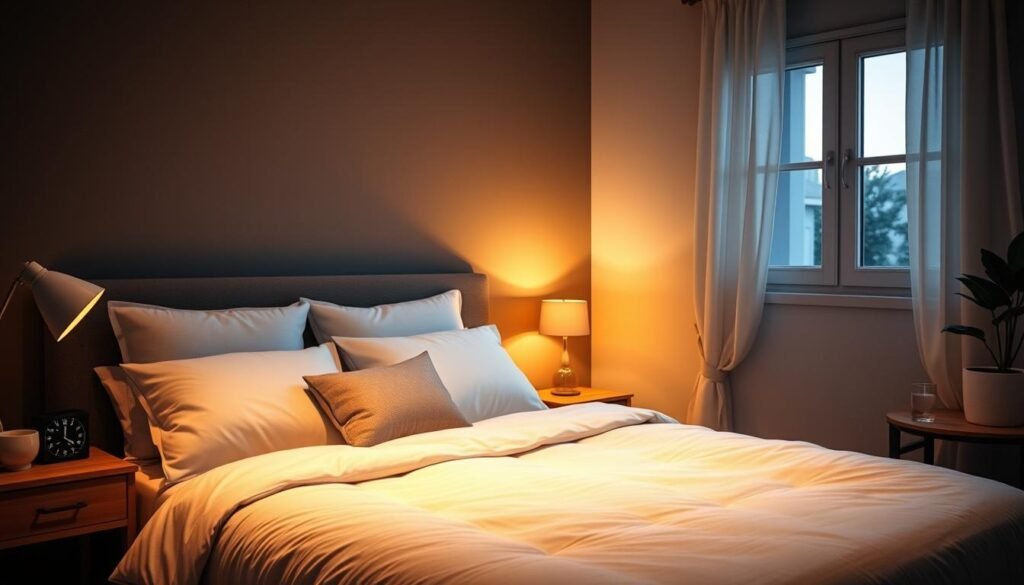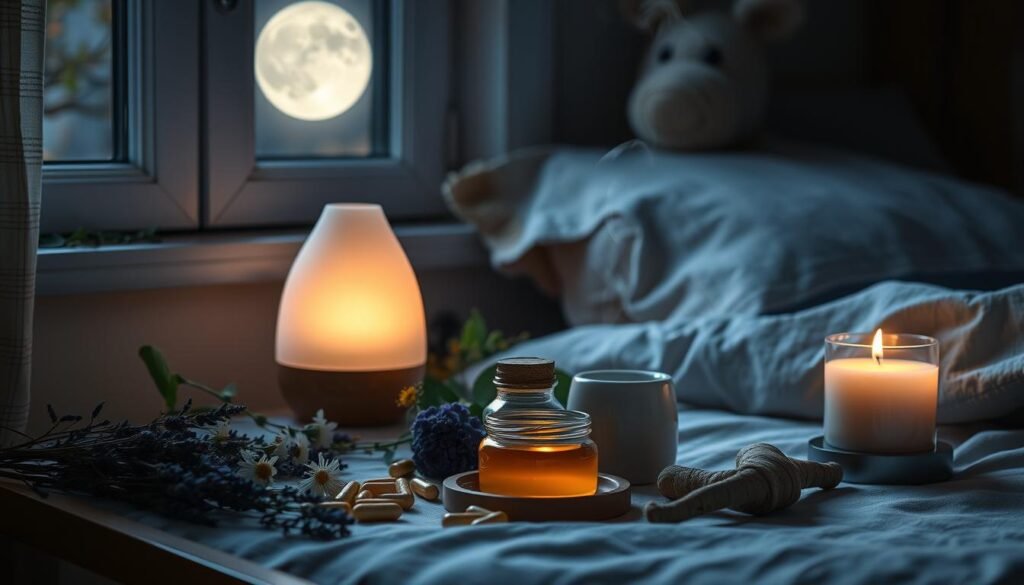Ever wonder why it’s hard for many to fall asleep, even though sleep is crucial for health? Research shows over 80% of people have trouble sleeping occasionally, with 37% facing frequent issues. Lack of sleep, often due to insomnia, makes one feel exhausted and harms both physical and mental health. It’s important to learn how to beat insomnia to improve your life.
Finding the right remedies and bedtime routines is key. This article shares insights and tips for better sleep. Whether stress, uncomfortable beds, or anxious thoughts are to blame, a good night’s sleep isn’t far away.
Key Takeaways
- More than 80% of individuals report difficulty falling asleep at times.
- Practicing good sleep hygiene promotes better sleep quality.
- Stress and anxiety are common causes of sleep troubles.
- Nutrition influences sleep, with certain foods aiding relaxation.
- Relaxation techniques enhance sleep by calming the mind and body.
Understanding Insomnia and Its Impact on Health
Insomnia is a common sleep issue faced by many. It’s hard to fall asleep, stay asleep, or you might wake up too early. This condition often leads to not getting enough sleep.
This lack of sleep affects your body and mind negatively.
Defining Insomnia
Insomnia means having ongoing trouble with sleep. Some adults face short-term insomnia for days or weeks. But chronic insomnia lasts for three months or longer.
Stress, getting older, and changes in hormones can lead to insomnia.
Effects of Sleep Deprivation on Physical Health
Sleep deprivation impacts our bodies greatly. It leads to tiredness and makes it hard to think clearly. Not sleeping enough over time ups the risk of serious health issues like diabetes and heart disease.
It’s key to tackle sleep problems early to protect our physical health.
Effects of Sleep Deprivation on Emotional Health
Not getting enough sleep does more than hurt our bodies. It also worsens mental health issues such as anxiety and depression. Poor sleep and emotional problems feed into each other, making it harder to sleep well.
| Health Aspect | Impact of Sleep Deprivation |
|---|---|
| Physical Health | Increased risk of chronic diseases (e.g., diabetes, heart disease) |
| Cognitive Function | Memory problems, impaired ability to concentrate |
| Emotional Well-being | Heightened anxiety and depression symptoms |
| Fatigue | Persistent tiredness, lack of energy |
Common Causes of Trouble Falling Asleep
Trouble sleeping comes from many issues that mess up our night’s rest. Knowing these causes is key to finding solutions. Below, we discuss major reasons for sleep problems leading to consistent insomnia.
Stress and Anxiety
High stress and anxiety can make relaxing hard. This makes it tough to fall asleep. Worrying about daily tasks can start a pattern of sleepless nights.
Uncomfortable Sleep Environment
Things like room temperature, noise, and bed comfort affect sleep. If your mattress or pillow is not comfortable, it’s hard to relax. This can make falling asleep difficult.
Substances Affecting Sleep Quality
Drinking caffeine, smoking nicotine, and consuming alcohol harm sleep. These can keep you awake when you try to sleep. It’s harder to fall and stay asleep because of them.
| Cause | Description | Impact on Sleep |
|---|---|---|
| Stress and Anxiety | Worrying thoughts and emotional distress | Difficulty relaxing, leading to prolonged wakefulness |
| Uncomfortable Sleep Environment | Distracting noises, poor mattress quality, unfavorable temperatures | Inability to fall or stay asleep |
| Substances | Caffeine, nicotine, alcohol | Interference with natural sleep cycles, causing abrupt awakenings |
Focusing on these causes of insomnia can help us sleep better. It’s crucial to know how certain factors impact sleep. By doing so, we can improve our sleep quality.
How to Overcome Trouble Falling Asleep
Starting to tackle sleep issues can be simple. Begin by setting a regular sleep routine. This method helps the body and mind prepare for rest. Achieving seven to eight hours of sleep nightly is key for health. Before bedtime, using relaxation methods can set a calm mood. This makes it easier to go from being awake to sleeping.
Establishing a Sleep Routine
Having a fixed sleep schedule helps our internal clock stay regular. Associating the bedroom with calmness can reduce stress, helping you sleep better. Practices like reducing screen time before bed are crucial. Good sleep hygiene is linked to better sleep.
Utilizing Relaxation Techniques
Relaxation tactics, like breathing exercises and muscle relaxation, improve falling asleep. They get the body and mind ready for rest. Being active also boosts sleep quality. The National Sleep Foundation notes active people sleep more soundly.
Diet and Its Role in Sleep Quality
Food affects how well we sleep. Avoiding large meals, caffeine, and alcohol before sleep is wise. These can mess up our sleep. But, warm milk or chamomile tea can calm us down, making it easier to sleep.
Effective Insomnia Remedies
Seeking effective solutions for insomnia is crucial for anyone battling sleep issues. Many people look into both natural aids and sleep medications when other methods don’t work. Each option can lead to better sleep, but they have their own benefits and possible downsides.
Natural Sleep Aids and Supplements
Natural sleep aids are becoming more popular for those avoiding prescription drugs. Some preferred options include:
- Melatonin: A hormone that our brain makes. It helps fix sleep schedules that are off.
- Valerian root: Found in herbal teas, it’s used for its calming effect to help people relax at night.
- Passionflower: This supplement may reduce anxiety and improve sleep quality by promoting calm.
- Chamomile: Famous for its relaxing qualities, chamomile tea is a nightly routine for some to de-stress.

Prescription and Over-the-Counter Medications
Some may need medication for sleep, in addition to natural aids. The prescription medicines often include:
- Benzodiazepines: These sedatives work well for short-term sleeping problems but could lead to dependency.
- Non-benzodiazepine sleep medications (Z-drugs): Zolpidem and eszopiclone usually offer fast relief with fewer dependency risks, making them a choice for some.
Over-the-counter options like diphenhydramine are also out there. They’re popular but can have side effects, so be careful. Talking to a healthcare provider before beginning any drug can help ensure it’s right for you, given your health needs and situation.
Creating a Sleep-Friendly Environment
Having the right atmosphere can deeply affect how well you sleep. A good sleep environment helps with falling and remaining asleep all night. It’s important to know what makes a bedroom perfect for sleep.
By improving your bedroom, you can turn it into a peaceful place. This will help you relax and enjoy restful sleep.
Optimizing Bedroom Conditions
To make your bedroom better for sleeping, set the temperature between 60 and 67°F (15.6 to 19.4°C). This temperature helps you sleep deeply. Use thick curtains or blackout blinds to keep it dark. This helps your body produce melatonin, which you need for good sleep.
Also, try to keep your room tidy. A clean room makes you feel calm and relaxed. This makes it easier to fall asleep after a busy day.
Minimizing Noise and Light Disruptions
Noise and light can make it hard to sleep well. Using white noise machines or earplugs can block out sounds. It’s also important to avoid screens that emit blue light before bed. Blue light can disturb your sleep cycle.
Creating a quiet and dark room helps improve your sleep. It also leads to a healthier life. For more advice on sleeping better, check out these essential tips for sleep health.
Implementing Good Sleep Hygiene Tips
Good sleep hygiene is key to better sleep and managing insomnia. By improving certain habits, people can sleep better and be healthier. It’s important to keep a regular sleep schedule, avoid naps and stimulants, and have the right bed and bedding.
Maintaining a Consistent Sleep Schedule
Keeping a regular sleep schedule helps your body’s natural sleep cycle. Sleeping and waking up at the same time every day makes falling asleep easier. If you need to change your sleep times, do it slowly to stick to your routine.
Avoiding Naps and Stimulants
Napping during the day can feel refreshing but may harm your night’s sleep. Keep naps short and early if you must take them. Also, avoid caffeine and nicotine before bed to sleep better.
Choosing the Right Bed and Bedding
Your bed and bedding matter a lot for good sleep. A comfortable mattress that supports your body makes a big difference. The right bedding also helps make your sleep space cozy and inviting for rest.

Summing it up, good sleep habits like a consistent sleep schedule, avoiding naps and stimulants, and choosing comfy bedding improve sleep quality and wellness.
Managing Stress for Improved Sleep
Managing stress plays a big role in getting better sleep. Many people can’t sleep because of stress and worry. This affects their health. Adding mindfulness and meditation to your daily life helps a lot. These methods can quiet a busy mind, letting you fall asleep easier. Doing physical activity for sleep also reduces stress. It improves both your mood and your sleep.
Mindfulness and Meditation Practices
Mindfulness and meditation really help lower stress. Doing yoga, tai chi, and deep breathing relaxes you. It also cuts down stress hormones, which serves your sleep. Just 20 to 25 minutes every day can boost your mental and physical health. People sleeping better often use these methods. They redirect thoughts that lead to worry.
Physical Activity and Its Benefits
Regular exercise is key for less stress and better sleep. It releases extra energy, easing muscle tension and anxiety. Working out two hours before bed gets your body ready for sleep. Your body cools down, which helps you sleep better. Eating right is important too. Avoid junk food and too much sugar to keep your energy steady and stress low.
Journaling and Reflection Techniques
Writing in a journal helps manage stress and sleep better. Writing out your thoughts and feelings before bed helps you deal with emotions. It makes for more peaceful rest. You can write down what needs to get done or what you’re thankful for. This encourages calmness. Combining thought management with these steps offers a full plan to tackle stress and poor sleep.
Relaxation Techniques for Better Sleep
Many people find it hard to sleep well, with about one-third of adults having chronic insomnia. Learning how to relax before bed is a key way to fight off sleep troubles. Here are some helpful methods that can make your sleep better.
Controlled Breathing Exercises
Breathing exercises help you relax by making your breath steady and calming your mind. Techniques like diaphragmatic breathing and the 4-7-8 method are good for this. They reduce stress and get your body ready for sleep. Doing these exercises often works better than doing them once in a while.
Progressive Muscle Relaxation
This method involves tightening and then relaxing different muscles in your body. It helps with both physical and mental stress. Letting go of the tension helps you sleep deeper. Also, doing this regularly can improve your sleep over time.
Imagery and Visualization Techniques
With imagery, you picture calm places or events to relax and get ready for sleep. These exercises help your mind move away from stress and towards peace. Using visualization often makes it easier to fall asleep and goes well with other relaxation methods.
| Technique | Description | Benefits |
|---|---|---|
| Breathing Exercises | Diaphragmatic breathing and the 4-7-8 technique. | Induces calm and reduces anxiety. |
| Progressive Muscle Relaxation | Tensing and relaxing muscle groups. | Releases physical and emotional stress. |
| Imagery Techniques | Picturing soothing and peaceful scenarios. | Promotes relaxation and enhances sleep transition. |
Using these relaxation techniques regularly can help fix sleep problems and improve your sleep. If you’re still struggling with sleep, it might be a good idea to talk to a doctor. They can offer other solutions that might work better for you.
Exploring Cognitive Behavioral Therapy for Insomnia
Cognitive behavioral therapy for insomnia, known as CBT-I, helps with sleep issues. It deals with how thoughts, feelings, and actions can affect sleep. It’s great for those with chronic sleep problems. About 33% to 50% of adults find it hard to fall or stay asleep regularly.
Understanding CBT-I Principles
CBT-I teaches people about sleep and setting good sleep goals. CBT-I techniques improve sleep habits. It has five main parts: sleep consolidation, stimulus control, cognitive restructuring, sleep hygiene, and relaxation methods. People in CBT-I often fall asleep 19 minutes faster and sleep 8 minutes more.
Behavioral Techniques to Improve Sleep
To sleep better, changing habits and the sleep environment is key. Sleep restriction therapy cuts down time awake in bed. Stimulus control therapy changes sleep-disrupting behaviors. Relaxation techniques like mindfulness and breathing help with pre-sleep relaxation. Around 70% to 80% of people using CBT for insomnia see better sleep quality.
Utilizing Natural Sleep Aids
Looking for other ways to solve sleep problems is helpful for many. Natural sleep aids give multiple choices for those needing insomnia relief. They cover a variety of herbal solutions and melatonin, a key hormone in sleep control.
Herbal Remedies for Sleep
Some herbal remedies have been used for a long time to enhance sleep. The most well-liked ones include:
- Valerian Root: Known for its soothing effects, it may help you sleep better. It is most helpful when taken in amounts of 300–600 mg before bed.
- Passionflower: Famous for its relaxing effects, it could aid in handling insomnia symptoms with minor side effects.
- Lavender: Often chosen for aromatherapy, lavender can make sleep better, especially in older people.
- Chamomile: Though a traditional remedy, its efficiency for sleeplessness needs more proof.
Although these herbal remedies can be useful, it’s vital to know about possible side effects. For example, valerian root might lead to headaches and stomach issues for some. Always talk to a healthcare provider before trying any herbal solution to make sure it’s safe and to get the correct dosage.
The Role of Melatonin in Sleep Regulation
Melatonin is essential for managing our sleep-wake cycles. Research shows that it can help you fall asleep quicker and feel more ready to sleep. Taking even small amounts, between 0.1 and 0.3 milligrams, can work for most. Using melatonin for a short period, up to three months, is usually safe.
Studies say that mixing melatonin with magnesium and vitamin B can treat insomnia well, no matter the reason. Though melatonin has benefits like better sleep quality, it might have side effects like feeling sleepy during the day, headaches, and feeling dizzy. It’s best to talk with a healthcare expert to customize the solution to your needs.

The Importance of Nutrition for Sleep Quality
Nutrition is key for better sleep. Knowing which foods to avoid before bed and what sleep-promoting foods to eat makes a big difference. Eating meals at the right time also helps you sleep better. Stay away from heavy foods and certain snacks before bed to avoid sleep problems.
Foods to Avoid Before Bedtime
Some foods can ruin your sleep if eaten at night. It’s important to steer clear of these:
- Caffeine-filled drinks in the evening can make falling asleep hard.
- Alcohol may seem to help at first, but it hurts REM sleep later.
- Burgers and fries, being heavy and fatty, can lessen deep sleep.
- Snacks with a high sugar level can wake you up due to hunger.
Experts from the field of nutrition for sleep quality recommend healthier eating for better sleep. This prevents sleep disturbances.
Foods that Promote Better Sleep
Certain foods can improve your sleep. Adding them to your evening meals might help:
- Almonds and walnuts are full of magnesium, which helps you start sleeping.
- Eating foods like tart cherries and kiwifruit, which have melatonin, helps your natural sleep cycle.
- Try turkey and dairy for tryptophan, a sleep booster.
- Salmon and tuna, rich in omega-3, can enhance sleep quality.
Choosing the right foods is crucial for sleep health. A diet rich in helpful nutrients can positively impact sleep. It shows how vital nutrition for sleep quality is for improving rest.
| Food Category | Promoting Sleep? | Reason |
|---|---|---|
| Caffeine-rich foods | No | Interferes with falling asleep |
| Alcohol | No | Disrupts REM sleep |
| High-fiber fruits and vegetables | Yes | Improves overall sleep quality |
| Melatonin-rich foods | Yes | Supports the sleep-wake cycle |
Conclusion
Getting enough sleep is crucial for our health. Sadly, about 43% of Americans don’t get enough rest. Insomnia makes it hard for people to sleep well. It harms our daily lives and can cause serious health problems if ignored.
To sleep better, we need to follow a few steps. We should have a regular sleep schedule and make our bedrooms sleep-friendly. It’s also important to handle stress by practicing mindfulness and working out. Instead of using sleeping pills, Cognitive Behavioral Therapy for Insomnia (CBT-I) has been shown to be a safe and effective treatment.
Understanding our sleep habits is the first step towards making healthy choices. For those dealing with long-term insomnia, it’s wise to seek advice from a doctor. They can offer customized treatments that help you enjoy deep, healing sleep.